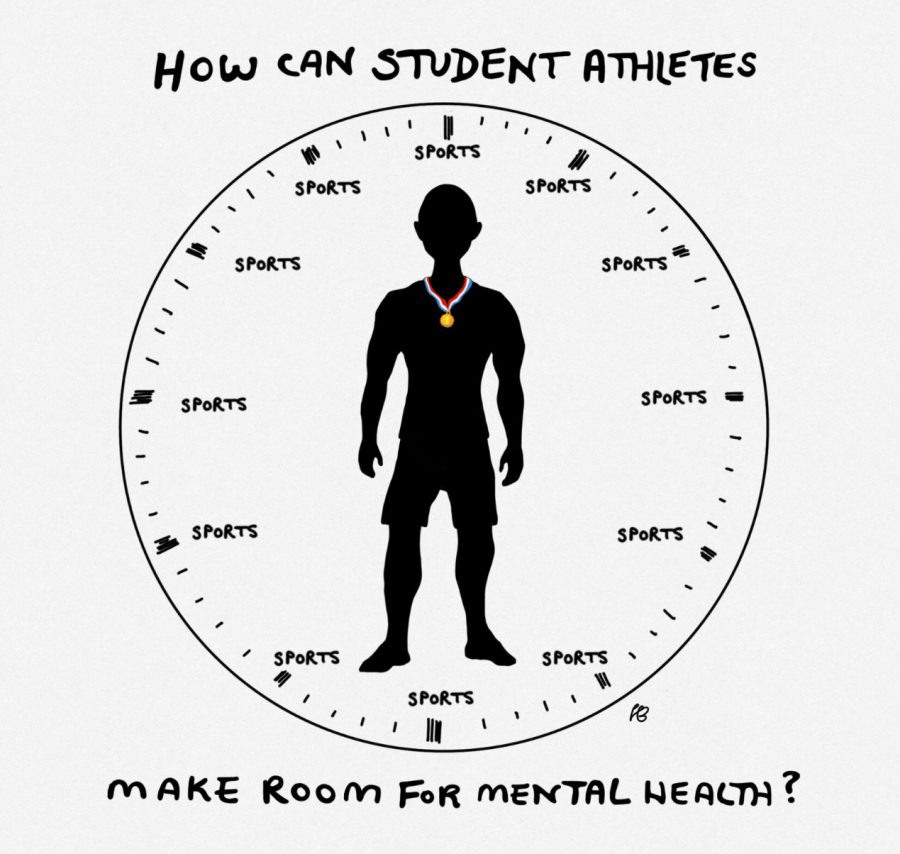West Athletes Open Up About Mental Health
Elite athletes, perceived as strong, resilient, mentally tough individuals who can handle the constant pressure to be the best. We always see them on the court or on the field shooting the best shots and making the hardest plays, but never in practice pushing their limits and doing whatever it takes to be perfect. They never want to let down anybody, not their coach, not their team, not their school, and especially not themselves. It’s all or nothing. It’s either they are the best, or be that person who couldn’t reach their dreams. And this is a problem that the athletic community has today, young athletes putting too much pressure on themselves creating tunnel vision that they don’t take a second to focus on themselves.
When young athletes set high standards for themselves to become the best they have to train, a lot. The girls gymnastics coach at Glenbard West, Mr. Fuentes, talks about some of the sacrifices these gymnasts have to make to reach their goals. He says, the main sacrifice is time. “For these athletes, training is not just a hobby or something they do for fun, it’s a full time job. They are training 20- 30 hours a week, practicing their routines, perfecting their skills, and pushing themselves to the max.” This demanding training schedule can take a toll on their mental health. Studies have shown that intense, athletic training can have both physical and psychological effects on young athletes, while intense training can lead to improved physical performance and increased self-esteem. It can also lead to increased risk of injury and burn out. The pressure to meet high standards and perform consistently at a high level can lead to stress, anxiety and other mental health issues; however, not all is negative from the strict training schedule, it can also have positive effects such as increased motivation and resilience. It is important for coaches, parents and athletes to find a balance between the intense training and the well-being of the athlete.
The constant training schedule leaves little time for anything else like spending time with friends, doing other activities, and even school. Some private elite gymnastics programs outside of high school gymnastics provide schooling within their gym like Xtreme Gymnastics and the US Gymnastics Development Center. This allows them to take as little time away from their training so that they can pursue their athletic dreams without sacrificing their education, but that does mean they have to miss out on school experiences like sporting events, clubs, and school dances. Another option is homeschooling, it provides the same benefits as the schooling within the gym, but you still have to miss out on a lot of activities. It’s not only gymnasts that may have to go with this alternative education route, hockey and soccer players have to deal with this too.
Parents play a crucial role in athletes’ lives, especially with their confidence and success. Supportive parents are a great source of motivation and encouragement. They provide the athletes with emotional support, building their confidence, and giving guidance and help them achieve their goals. They also provide a sense of security, helping the athletes cope with the pressures of competition and the fears of failing. However, when parents’ involvement becomes too much it can have a negative impact on them and their mental health. When a parent becomes too involved, like being too pushy or demanding, it may put too much pressure on their child leading to burnout and possible mental health issues. An article about the importance of parent involvement titled, The Importance of Parental Involvement in Youth Sports, by the National Academy of Athletics, says, “The parent that is too hard on their child to win or be successful will chase them away from falling in love and wanting to play- the child will want to quit.” So how are these kids trying to find what they love, and maybe something they want to pursue through their life when their parents are making the situation worse.
Mr. Hetlet, the Glenbard West head football coach says, “I think sometimes parents get a little bit too involved, and sometimes parents live vicariously through their kids. And maybe they want their kids to achieve things they didn’t achieve, or maybe their expectations for their kids are not what they feel. I think its parents need not to impose their will. I think the kids need to figure out what they like to do in sports, arts, or music, and then support them.”
These kids are already stressed about winning the next game, finishing their homework after practice, being the best they think they can be, but then add on that car ride home or dinner when they have to listen to their own parents go on about how they should be winning and being the best when sometimes it’s not in their control. It is very unnecessary, especially when the parents are sometimes the only support group the kids have and the ones that the kids can talk to if they are struggling with anything going on in their life, if that’s related to sports or not.
One of the biggest challenges facing elite athletes is the stigma associated with mental health. Many athletes feel pressure to hide their struggle to appear strong, and don’t need any “help”. They worry that admitting to mental health issues could damage their reputation or make them appear weak. So, often athletes are suffering with no one knowing and worsening their problems. Mr. Zander, Glenbard West health teacher says, “Society as a whole only seeks help for mental and emotional disorders 30% of the time and I am sure it is at least that low for athletes. Why? I think athletes are trained to ‘be tough’ and ‘no pain, no gain’ and ‘never let them see you struggle’… all these types of things are ingrained in athletes and make it very difficult to admit when they are hurting or need help. Unfortunately seeking help has been viewed way too long as a sign of weakness.”
The pressure to perform and meet high standards in competitive sports can have both positive and negative effects on young athletes. While intense training can lead to improved physical performance and increased self-esteem, it can also lead to mental health issues such as stress, anxiety, and burnout. The constant training schedule can also leave little time for other activities and education, leading to alternative schooling options such as homeschooling. Parents play a crucial role in their child’s success but when their involvement becomes too much, it can have a negative impact on their child’s mental health. The stigma associated with mental health can also make it difficult for athletes to seek help when needed. Finding a balance between intense training and an athlete’s well-being is important to ensure their success on and off the field.
Student athletes, it doesn’t matter what other people are doing, you should find what is best for you. What you are doing is something you signed up for to have fun and enjoy your time playing whatever sport you choose. So if at any time you feel off or not right about something if that’s with sports, school, or anything else it’s ok to seek help, and I know you have heard that a bunch of times, but it’s true and it won’t hurt. You are only helping yourself be the best person you can.
And parents, I know it may seem like your child is old enough to deal with their own problems, but having a little conversation with them or helping them seek help may not seem like a big deal to you, but it can make a big difference in their lives and maybe encourage others to do the same. You never know what a few good words or actions can do to someone.










